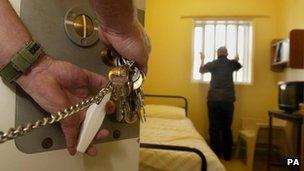Votes for prisoners - opening the door?
- Published
- comments

Parliament is overwhelmingly opposed.
Polls suggest the public are incredulous at the idea. And, famously, we all know that it makes David Cameron physically sick.
So it is not that surprising that this Thursday the government will stick two legislative fingers at the European Court of Human Rights and say no to giving convicted prisoners the vote.
Only that is not what the government is going to do. What the government will do for the first time is formally open the door to the possibility of some convicted prisoners getting the vote.
The draft bill that the Lord Chancellor - that's Chris Grayling, in case you had forgotten - will announce in a statement to Parliament contains three options: keep the existing blanket ban; give the vote to convicted prisoners serving up to six months; or give it to those serving up to four years.
The overwhelming assumption is that if this ever came to a vote, MPs would repeat what they did in February last year when they voted by 234 to 22 to keep the blanket ban on prisoner voting.
Looming deadline
But the government has to allow for the possibility that MPs might go another way.
That is because the deadline the government has to meet by 1600 GMT on Friday is not simply to say something about its plans for prisoner voting.
The deadline is for the government to say something meaningful about prisoner voting, something that would ensure that the government meets the rulings of the European Court of Human Rights (ECHR).
To quote the ECHR, the government is obliged "to introduce legislative proposals with a view to the enactment of an electoral law to achieve compliance with the Court's judgments".
The Council of Europe - the body that oversees the ECHR - is more specific. The government, it says, has "to introduce legislative proposals to amend the electoral law imposing a blanket restriction on voting rights of convicted prisoners in prison, and achieve compliance with the Court's judgment".
So Thursday's draft bill does three things:
1. It technically meets - or so ministers hope - the ECHR's deadline by publishing legislation that potentially could end up watering down the blanket ban. It would be quite tricky for the Court to reject this approach out of hand, however obvious and likely it is that MPs will vote against prisoner voting again.
2. It parks the issue firmly in the long grass. A joint committee will have to be set up to consider the draft bill. That committee will probably not rush its fences. It certainly would be unlikely to work fast enough to allow the government to bring forward a proper bill in next May's Queen's Speech. So that means a Bill in the session beginning May 2014. And that is getting close to a general election campaign and anything can happen then.
3. It throws the ball firmly back in the Court's court, so to speak. The government's decision to introduce a draft bill would probably be challenged by a disenfranchised prisoner and the ECHR would have to decide whether to rule on that. The court could decide to wait until the vote takes place, and then rule on that. The key question is whether or not the ECHR thinks that a parliamentary decision is enough to get the UK off the hook, or whether it is irrelevant. But that is a decision for another day.
There is, however, a sting in the tale.
Test case?
I am told that it is not actually the ECHR that is forcing the pace on this. The real issue that is concerning the government is a case sitting before the Supreme Court here in the UK and it is a case that could change the whole debate.
George McGeoch is serving a life sentence in Dumfries prison for murdering a man in Inverness.
He is not arguing that the blanket ban on prisoner voting breaches his rights under the European Convention. He is arguing that his rights as an EU citizen are being infringed because he will not be able to vote for in the European Parliamentary elections in 2014.
The draft bill that Chris Grayling will publish this week will refer not just to prisoners' voting rights relating to domestic general and local elections. It will also refer to elections to the European Parliament.
So the hope in the Ministry of Justice is that the draft bill will delay - and ultimately sway - any decision by the Supreme Court on this matter so that Mr McGeoch does not end up with the vote.
Compensation concern
And that is an important hope. For if the Supreme Court did allow Mr McGeoch to get his name on the register of electors that would automatically allow thousands of other convicted prisoners around the UK to vote in European and municipal elections.
And many of them would demand compensation for past electoral moments they had missed. And that would be hugely expensive to the government.
Ministers can in theory ignore unenforceable compensation orders from the ECHR. But they cannot do the same when the Supreme Court issues what are called Francovich damage orders, in other words, fines for breaking EU law.
So there would be a mess. The government would be forced to rush emergency legislation through Parliament. Compensation claims would come rushing in.
So the key test for this Thursday's draft bill is not just what the judges in Strasbourg say. It is also how those judges sitting on the other side of Parliament Square respond.